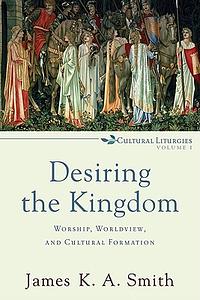Take a photo of a barcode or cover
I found the thesis and topics discussed to be very interesting. The writing was quite academic, a little heady but not too hard to follow. I thought a lot of his points were spot-on, and was impressed to see how he boldly criticized American Christian politics/patriotism as a secular framework not in keeping with the kingdom of God.
Another review mentions the lack of Scriptural references and support for his claims, and I agree that this was a shortcoming of the book. The author certainly operates through a very biblical framework but doesn't really cite specific verses at all, although he uses numerous other historical and contemporary Christian sources. That bothered me, once it was pointed out. There were more Scriptures toward the end of the book where he talks about practices of worship, and I appreciated how he didn't get into hashing out theology or favoring a specific denomination.
All told, a worthwhile, thought-provoking read!
Another review mentions the lack of Scriptural references and support for his claims, and I agree that this was a shortcoming of the book. The author certainly operates through a very biblical framework but doesn't really cite specific verses at all, although he uses numerous other historical and contemporary Christian sources. That bothered me, once it was pointed out. There were more Scriptures toward the end of the book where he talks about practices of worship, and I appreciated how he didn't get into hashing out theology or favoring a specific denomination.
All told, a worthwhile, thought-provoking read!
challenging
informative
reflective
slow-paced
informative
reflective
slow-paced
Read this for the first time after graduating from high school. At the time, this book had the singles greatest impact on me of any book I had ever read. It shaped in me a new, embodied understanding of the world and the practices that shape it that shape me. Everything looked different after reading this book: from things as great as ideologies and identities to things as simple as sports and shopping patterns. If I was seeing the world askant before, I saw it level for the first time bc of this book.
There’s so much to learn from this book about how to practice an integrated, critically evaluative, liturgically aware life. But there’s even more fruit to enjoy from that labor.
Rereading this month.
There’s so much to learn from this book about how to practice an integrated, critically evaluative, liturgically aware life. But there’s even more fruit to enjoy from that labor.
Rereading this month.
challenging
informative
slow-paced
A mentor once asked me, for the sake of exploration and thought, what I thought the biggest problem with American Christianity was. I think this book gets really close to answering that exact question. With categorical clarity and anthropological insight, Smith challenges the way we "do church," specifically by wondering whether our spiritual practices are simply outgunned by the massive volume of spiritual formation that happens every day in the marketplace, school, and home.
3.5 stars. In the first half, Smith does an excellent job of explaining why his audience (mostly fundamentalist and reformed Christians) need to pay less attention to “worldview” and more attention to embodied practice. In the second half, Smith is less successful at explaining how to apply these ideas in churches and Christian colleges.
Short Review: I mostly listened to the audiobook of this. The narrator was fine, but he wasn't Jamie Smith and Smith would have done a better job. I don't know why publishers don't let authors narrate their own books more often. No one knows the book better than the author. (Smith did say on twitter that he would have narrated it if he had been allowed.)
I am very late to this book. I have read six of Smith's books previously. At least two of those I have read twice. I have watched a number of videos of Smith speaking. There was little of the larger argument that I was unfamiliar with. I was familiar with almost all of the illustrations as well. But I still am glad that I read the book. Some of Smith's books can be a little philosophically heavy. I don't have a great philosophy background so that can really slow me down as I work through a book. But this was clear and I am not really sure why it has a reputation of being a bit academic. Imagining the Kingdom is much more academically oriented than Desiring the Kingdom is.
The short version of the argument is that we as human are not changed or formed primarily through information. Instead we are formed and changed by habit and ritual which then give form to the information we process. Culture hits us with liturgical practices all the time. So as the church, we have to counter the liturgical practices of culture by intentionally subverting them with Christian liturgical practice. This doesn't mean we all need to go to high church. This means that our practices of worship and communal life need to be thought through and be made to support the theological life of the believer (both individual and corporately).
I have about 1200 words that details this more clearly on my blog http://bookwi.se/desiring-the-kingdom/
This is a book that still should be widely read and recommended even if it is 9 years old now.
I am very late to this book. I have read six of Smith's books previously. At least two of those I have read twice. I have watched a number of videos of Smith speaking. There was little of the larger argument that I was unfamiliar with. I was familiar with almost all of the illustrations as well. But I still am glad that I read the book. Some of Smith's books can be a little philosophically heavy. I don't have a great philosophy background so that can really slow me down as I work through a book. But this was clear and I am not really sure why it has a reputation of being a bit academic. Imagining the Kingdom is much more academically oriented than Desiring the Kingdom is.
The short version of the argument is that we as human are not changed or formed primarily through information. Instead we are formed and changed by habit and ritual which then give form to the information we process. Culture hits us with liturgical practices all the time. So as the church, we have to counter the liturgical practices of culture by intentionally subverting them with Christian liturgical practice. This doesn't mean we all need to go to high church. This means that our practices of worship and communal life need to be thought through and be made to support the theological life of the believer (both individual and corporately).
I have about 1200 words that details this more clearly on my blog http://bookwi.se/desiring-the-kingdom/
This is a book that still should be widely read and recommended even if it is 9 years old now.
Obviously, I couldn't recommend this book more. It is a great hybrid as Smith says between popular level and academic level work, so in that way sufficiently challenging but not overwhelming. Smith is shaping so much of what I believe and think about the Christian life and how the Gospel interacts with culture. Spoiler: it often doesn't look like the contemporary church and the "Christianized" version of the world's cultural goods. He also breaks down the idea of worldviews and goes deeper to the level of social imaginaries, and that's all fascinating. On to volume two!
The central point of Smith's entire argument in this work is that we, as human beings, are not primarily thinking animals (modern anthropology), nor are we believing animals (world-view anthropology), but first and foremost we are desiring, worshiping (liturgical) animals. Just as it has been demonstrated that world-view shapes our thinking, or our rationality, so liturgical practices shape our worldview. Smith explicates three secular liturgies - the mall (economic), the stadium (political), and the university (educational) - to show the disturbingly religious components to these seemingly secular activities. He then explicates liturgies of the church from various traditions. Aside from an unnecessary discussion on habits in the first chapter (which may or may not have had a whiff of Pelagianism about it) and a footnote reference to Tillich that I wasn't sure I agreed with, there was little in this book to which I would object. I found particularly exciting his continual emphasis on embodiment, his discussion on the relationship between theology and those with developmental disabilities, and his comparison of the Creed and the Pledge.




